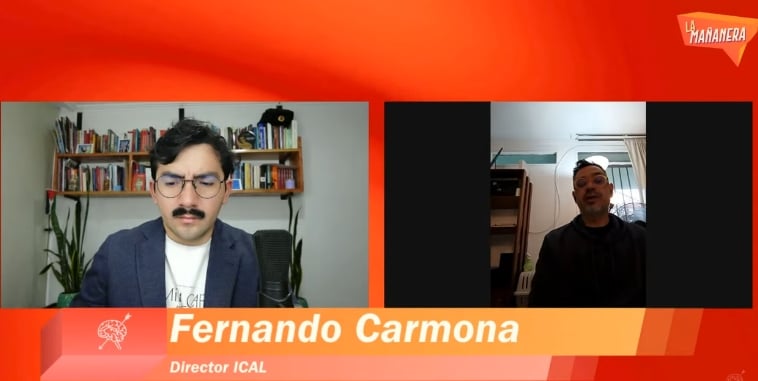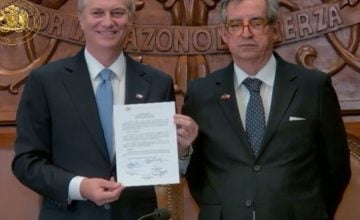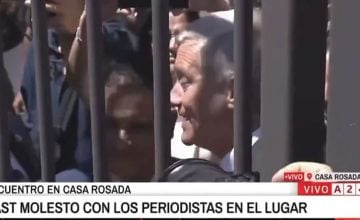Original article: “Debería llevarnos a una desigualdad aún mayor en la distribución de la riqueza”: Fernando Carmona (ICAL) alerta por el programa de Kast
Fernando Carmona, director of the Alejandro Lipschutz Institute (ICAL), provided an in-depth analysis and warning regarding the potential impacts of José Antonio Kast’s government program during an interview this Wednesday on La Mañanera with El Ciudadano.
«What we are facing is a situation of labor precarization, which should lead us to an even more unequal distribution of wealth,» he stated.
During the segment hosted by el Director of El Ciudadano, Javier Pineda Olcay, the economist presented the findings of an ICAL report assessing the proposals from the Republican Party’s presidential candidate.
«It’s a program with limited scope that fails to address many public policies; their declared concerns focus on three emergencies: the social emergency, the economic emergency, and the security emergency,» noted Carmona, who resigned from President Gabriel Boric’s advisory team in late April to lead the programmatic efforts for Jeannette Jara, the Unidad por Chile candidate he has known since 1997.
In 2021, he fulfilled a similar role in the campaign of former mayor of Recoleta, Daniel Jadue (PC).
«Many Aspects Remain Unclear»
Carmona emphasized that due to the lack of specificity in Kast’s program, the institute focused on understanding its ideological position within the political spectrum.
«Our first step was to analyze their statements in the program to determine their position within the political landscape and the traditions they align with, aiming to grasp where this might lead. The program is not extensive, and many details remain unclear, so we focused on understanding the direction a José Antonio Kast government could take based on these declarations,» explained Lautaro Carmona Soto, the son of the Communist Party (PC) president, Lautaro Carmona.
«From our literature review and examination of the program, we identified a prominent idea of ultra-economic liberalism, which implies a significant reduction of the state, resulting in a much smaller role for social welfare and diminished wealth redistribution capabilities,» he added.
«Regressive Ultraliberalism»: Budget Cuts and Tax Reductions
The master’s degree holder in applied economics pointed out two central and critical economic measures identified in the analysis: cuts to public spending and tax reductions.
«This is explained by their proposal for massive public spending cuts, which the candidate has explained little, amounting to $6 billion in 18 months as they have stated. Second, the imposed tax reductions on large companies, which we view as very serious since cutting public spending by $6 billion while also reducing tax revenues seems problematic,» he noted.
«The challenge we will face after his government, if these proposals materialize, is that we will have a state with far less capacity than we currently possess, which has taken us several decades of public spending to build,» he warned.
Regarding the goal of cutting $6 billion, Carmona revealed inconsistencies in Kast’s team’s calculations.
«While the program does not clarify this, there have been statements from their economic advisor pointing in this direction. They have referenced a report from the Autonomous Fiscal Council (CFA), which proposes a $6 billion reduction over four years, aiming to cut social spending deemed inefficient. However, they seem to have misunderstood the CFA’s proposal, which actually suggests a $1.5 billion reduction, and when multiplied over four years, this results in $6 billion,» he argued.
«The very CFA pointed out that they misinterpreted the report. Moreover, the CFA proposes $1.5 billion over four years, which totals $6 billion in that timeframe. They took it literally as $6 billion and doubled down in 18 months, also reflecting a component of authoritarian populism within Kast’s theoretical framework,» he emphasized.
Labor Precarization and Deepening Inequality
On labor issues, ICAL’s director was adamant: «They envision an extreme labor flexibility model, which we refer to as weakening labor unions and precarizing the job market.»
He highlighted that one of the most concerning measures is the change in collective bargaining. «They propose a near individual negotiation model, which contradicts the principles recognized in labor contexts… transitioning from collective to individual bargaining reinforces existing imbalances in the labor market. The Chilean labor code clearly states that labor laws aim to balance this asymmetry. Thus, the situation exacerbates inequalities and weakens collective labor rights that have built most of the safeguards workers rely on in their roles,» he explained.
Carmona’s conclusion on this matter is dire: «Overall, what we foresee is a scenario of labor precarization that should, following their line of thought (not that they declare it outright), lead to a distribution of wealth, as measured by the Gini coefficient, even more unequal.»
«A highly unequal wealth distribution both before and after taxes is one of the least virtuous characteristics, so this indicates that the distribution of wealth or wealth inequality within the country will likely deepen,» he warned.

Critique of the «Theory» of Growth via Tax Reductions
Regarding the premise that lowering taxes for businesses spurs growth, Fernando Carmona warned that such measures could lead Chile off its growth path and into economic recession.
«Currently, we have what economists refer to as green shoots, indicating we are on a fragile recovery path. If these measures are implemented as proposed, it is likely we will regress into an economic recession. That is the consequence,» he asserted.
He debunked the theory behind the proposal, which he referred to as the «effect curve,» which posits that tax reductions allow companies to recapitalize and reinvest internally, supposedly fueling economic growth.
«What we have observed is that this does not happen. Economies grow primarily when companies see increased internal demand. This means higher wages, greater worker consumption, and enhanced public spending. A favorable balance between exports and imports, rising taxes, and increased public spending contribute to this growth,» he explained.
«Only when entrepreneurs see the economy on an upward trajectory do they invest or make full use of their productive capacity, which is known as effective demand. When demand becomes effective is when investments come into play—not merely because tax cut excesses remain. This theory lacks credible precedents to support its claims, having been applied without delivering the promised virtuous effects that the right or José Antonio Kast assert,» emphasized the economist.
Militarization and Escalating Violence
When questioned about the far-right candidate’s security proposals, Fernando Carmona warned they would cultivate a dual standard state: weak in social matters and strong in coercion.
«These measures increase the state’s coercive power over citizens, as they propose, for example, the permanent militarization of certain areas, meaning that the armed forces take on police roles,» he indicated.
He cautioned against the counterproductive effects of this strategy, citing international examples. «Such measures do not decrease violence, as exemplified in Mexico or Brazil; instead, they provoke a counter-reaction by criminal gangs, resulting in heightened insecurity in society, with crimes committed more aggressively,” he elaborated.
«When we compare the situation in Mexico from the early ’90s with today’s Chile, we find alarming similarities. If we continue down the path proposed by this militarization program, we can expect an escalation of violence, with criminal gangs boosting their firepower and increasing public unease,» asserted the analyst.
Authoritarianism, Weak State, and Recession: The Risks of Kast’s Program
When asked about elements within the Republican Party’s presidential platform that could raise greater public alarm regarding potential political, economic, and social ramifications, the ILCA director discussed three specific points:
Firstly, he noted that «militarization combined with the authoritarian nature proposed by this program would lead to a more volatile situation within the country… resulting in heightened violence.»
On economic matters, Carmona addressed the implications of regressive ultraliberalism tied to a diminishing state role.
«For example, currently, nearly 70% of public spending is social spending. Hence, if they decrease this amount, the most probable outcome would be significant cuts to social services,» he contended.
«We must be particularly vigilant, especially concerning health, as the right has persistently questioned health budget allocations. In terms of social emergencies, including health, there is a push for mass outsourcing of waitlists in health. This poses contradictions since outsourcing generally incurs double costs per operation or procedure. Such measures could severely affect the populace’s day-to-day lives and diminish the chances of building a better future,» he indicated.
He also warned that if these policies were enacted, should Kast ascend to La Moneda, Chile might face an economic recession.
«This set of proposals appears as a series of very poor measures, within a program that lacks detailed execution explanations, making them even more dangerous,» he stressed.
The ICAL report examining the content of the Republican candidate’s government plan is available on the study center’s website.
In the broadcast on Wednesday, November 26, La Mañanera, our director provided insights into Eduardo Frei’s support for José Kast.
You can watch the full program below:









